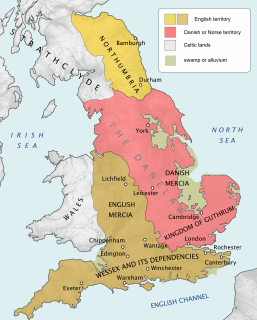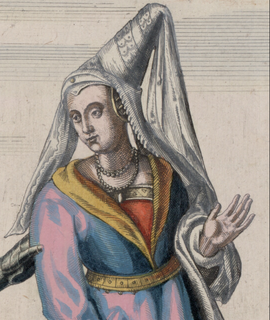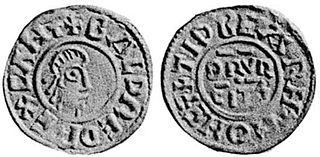Related Research Articles

Æthelred I was King of Wessex from 865 to 871. He was the fourth son of King Æthelwulf of Wessex. He succeeded his brother, Æthelberht (Ethelbert), as King of Wessex and Kent in 865.

Ecgberht, also spelled Egbert, Ecgbert, or Ecgbriht, was King of Wessex from 802 until his death in 839. His father was Ealhmund of Kent. In the 780s Ecgberht was forced into exile by Offa of Mercia and Beorhtric of Wessex, but on Beorhtric's death in 802 Ecgberht returned and took the throne.

Æthelwulf was King of Wessex from 839 to 858. In 825, his father, King Egbert, defeated King Beornwulf of Mercia, ending a long Mercian dominance over Anglo-Saxon England south of the Humber. Egbert sent Æthelwulf with an army to Kent, where he expelled the Mercian sub-king and was himself appointed sub-king. After 830, Egbert maintained good relations with Mercia, and this was continued by Æthelwulf when he became king in 839, the first son to succeed his father as West Saxon king since 641.

Æthelbald, King of Wessex was the second of five sons of King Æthelwulf of Wessex. In 850 Æthelbald's elder brother Æthelstan defeated the Vikings in the first recorded sea battle in English history, but he is not recorded afterwards and probably died in the early 850s. The next year Æthelwulf and Æthelbald inflicted another defeat on the Vikings at the Battle of Aclea. In 855 Æthelwulf went on pilgrimage to Rome and he appointed Æthelbald king of Wessex, while Æthelberht, the next oldest son, became King of Kent, which had been conquered by Wessex thirty years earlier. When Æthelwulf returned to England in 856, Æthelbald refused to give up the crown. Most historians believe that Æthelbald continued to be king of Wessex while Æthelberht gave up Kent to his father, but some scholars think that Wessex itself was divided, with Æthelbald ruling the west and his father the east, while Æthelberht kept Kent. When Æthelwulf died, in 858 Æthelbald continued as king of Wessex and his brother resumed his kingship of Kent.

Æthelberht was the King of Wessex from 860 until his death in 865. He was the third son of King Æthelwulf and his first wife, Osburh. Æthelberht was first recorded as a witness to a charter in 854. The following year Æthelwulf went on pilgrimage to Rome and appointed his oldest surviving son, Æthelbald, as king of Wessex while Æthelberht became king of the recently conquered territory of Kent. Æthelberht may have surrendered his position to his father when he returned from pilgrimage, but resumed the south-eastern kingship when his father died in 858.

Burgred was an Anglo-Saxon king of Mercia from 852 to 874.
Beorhtwulf was King of Mercia, a kingdom of Anglo-Saxon England, from 839 or 840 to 852. His ancestry is unknown, though he may have been connected to Beornwulf, who ruled Mercia in the 820s. Almost no coins were issued by Beorhtwulf's predecessor, Wiglaf, but a Mercian coinage was restarted by Beorhtwulf early in his reign, initially with strong similarities to the coins of Æthelwulf of Wessex, and later with independent designs. The Vikings attacked within a year or two of Beorhtwulf's accession: the province of Lindsey was raided in 841, and London, a key centre of Mercian commerce, was attacked the following year. Another Viking assault on London in 851 "put Beorhtwulf to flight", according to the Anglo-Saxon Chronicle; the Vikings were subsequently defeated by Æthelwulf. This raid may have had a significant economic impact on Mercia, as London coinage is much reduced after 851.

Æthelwold or Æthelwald was the younger of two known sons of Æthelred I, King of Wessex from 865 to 871. Æthelwold and his brother Æthelhelm were still infants when their father the king died while fighting a Danish Viking invasion. The throne passed to the king's younger brother Alfred the Great, who carried on the war against the Vikings and won a crucial victory at the Battle of Edington in 878.

Osburh or Osburga was the first wife of King Æthelwulf of Wessex and mother of Alfred the Great. Alfred's biographer, Asser, described her as "a most religious woman, noble in character and noble by birth".

Judith of Flanders was queen consort of Wessex and countess consort of Flanders. She was the eldest daughter of the West Frankish King and later Holy Roman Emperor Charles the Bald and his wife Ermentrude of Orléans. Through her marriages to two Kings of Wessex, Æthelwulf and Æthelbald, she was twice a queen. Her first two marriages were childless, but through her third marriage to Baldwin, she became the first Countess of Flanders and an ancestor of later Counts of Flanders. One of her sons by Baldwin married Ælfthryth, a daughter of Æthelbald's brother, Alfred the Great. She was also an ancestor of Matilda of Flanders, the consort of William the Conqueror, and thus of later monarchs of England.
Ceolnoth was a medieval English Archbishop of Canterbury. Although later chroniclers stated he had previously held ecclesiastical office in Canterbury, there is no contemporary evidence of this, and his first appearance in history is when he became archbishop in 833. Ceolnoth faced two problems as archbishop – raids and invasions by the Vikings and a new political situation resulting from a change in overlordship from one kingdom to another during the early part of his archiepiscopate. Ceolnoth attempted to solve both problems by coming to an agreement with his new overlords for protection in 838. Ceolnoth's later years in office were marked by more Viking raids and a decline in monastic life in his archbishopric.

Eadfrith of Lindisfarne, also known as Saint Eadfrith, was Bishop of Lindisfarne, probably from 698 onwards. By the twelfth century it was believed that Eadfrith succeeded Eadberht and nothing in the surviving records contradicts this belief. Lindisfarne was among the main religious sites of the kingdom of Northumbria in the early eighth century, the resting place of Saints Aidan and Cuthbert. He is venerated in the Eastern Orthodox Church, Roman Catholic Church, and Anglican Communion.
Æthelwulf was an Anglo-Saxon Bishop of Selsey.
The Bishop of Carlisle is the Ordinary of the Church of England Diocese of Carlisle in the Province of York.

Baldred was king of Kent, from 823 until 826 or 827. Ceolwulf I, king of Mercia, had ruled Kent directly, but in 823 he was deposed by Beornwulf, and at about the same time moneyers at Canterbury started issuing coins in the name of Baldred, king of Kent. It is uncertain whether he was independent or a Mercian under-king. In 826 or 827 he was expelled by Æthelwulf, son of King Egbert of Wessex, and Kent was ruled directly by Wessex thereafter.
Æthelstan, the eldest son of King Æthelwulf of Wessex, was the King of Kent from 839 under the authority of his father. The late D, E and F versions of the Anglo-Saxon Chronicle describe Æthelstan as Æthelwulf's brother, but the A, B and C versions, and Æthelweard's Chronicon, state that he was Æthelwulf's son. Some historians have argued that it is more probable that he was a brother, including Eric John in 1966 and Ann Williams in 1978. However, in 1991 Ann Williams described him as Æthelwulf's son, and this is now generally accepted by historians, including Frank Stenton, Barbara Yorke, and D. P. Kirby.
Æthelfrith was an ealdorman of southern Mercia, who flourished in the last two decades of the ninth century and the first decade of the tenth century. His father is unknown. He was married to Æthelgyth, daughter of Æthelwulf; Æthelwulf is unidentified, but a possible candidate is King Alfred the Great's brother-in-law, the ealdorman of the Gaini who died in 901. Æthelfrith was father to four ealdormen: Æthelstan Half-King, Ælfstan (Mercia), Æthelwald (Kent), and Eadric (Hampshire).
Athulf was a medieval Bishop of Hereford. He was consecrated before 971 and died after 1013.
Eahlstan was a medieval Bishop of Sherborne.
De abbatibus is a Latin poem in eight hundred and nineteen hexameters by the ninth-century Anglo-Saxon monk Æthelwulf (Ædiluulf), a name meaning "noble wolf", which the author sometimes Latinises as Lupus Clarus. It recounts the history of his monastery from its foundation through its six first abbots and ending with Æthelwulf's two visions. It is addressed to the Bishop of Lindisfarne, Ecgberht, and dates to between 803 and 821.
References
- ↑ Fryde, E. B.; Greenway, D. E.; Porter, S.; Roy, I. (1986). Handbook of British Chronology (3rd ed.). Cambridge: Cambridge University Press. p. 216. ISBN 0-521-56350-X.